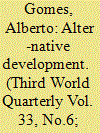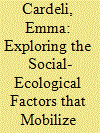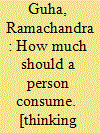| Srl | Item |
| 1 |
ID:
123514


|
|
|
|
|
| Publication |
2012.
|
| Summary/Abstract |
The goal of this article is to outline an indigenous form of social ecology offered as an alternative development model. Based on the normative system of the Orang Asli (Malaysian Aborigines), this model is characterised by various social, cultural and ecological ideas and practices undergirding the interconnected conditions of equality, sustainability and peace, which engenders a better life for all within the community. I contend that this model will provide lessons on how we might develop a normative paradigm to serve as an alternative to the current ecological and socially unsustainable mainstream and neoliberal development policy and practice, obsessed with the attainment of economic growth and greater market integration.
|
|
|
|
|
|
|
|
|
|
|
|
|
|
|
|
| 2 |
ID:
188033


|
|
|
|
|
| Summary/Abstract |
This article applies the social-ecological model to children’s mobilization into two violent groups—Central American gangs and terrorist organizations. While these two groups clearly differ in important ways, there are contextual similarities that frame a child’s involvement in each. For example, both flourish in low-resource settings where governmental structures may have been weakened or disrupted. Does it follow, therefore, that similar processes are at play in relation to children engaging in violent groups? This paper seeks to answer this question, reviewing available literature on the social-ecological factors that promote engagement in each group. Points of convergence and divergence between the groups are identified, and implications for prevention and intervention efforts are explored.
|
|
|
|
|
|
|
|
|
|
|
|
|
|
|
|
| 3 |
ID:
101534


|
|
|
|
|
| Publication |
DelhI, Permanent Black, 2006.
|
| Description |
xiii, 382p.
|
| Standard Number |
9789350092590
|
|
|
|
|
|
|
|
|
|
|
|
Copies: C:1/I:0,R:0,Q:0
Circulation
| Accession# | Call# | Current Location | Status | Policy | Location |
| 055604 | 333.720954/GUH 055604 | Main | On Shelf | General | |
|
|
|
|
| 4 |
ID:
104669


|
|
|